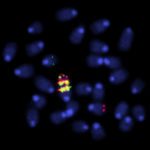Lien vers Pubmed [PMID] – 26833222
Nat Commun 2016;7:10529
XRCC4-like factor (XLF) functions in classical non-homologous end-joining (cNHEJ) but is dispensable for the repair of DNA double-strand breaks (DSBs) generated during V(D)J recombination. A long-standing hypothesis proposes that, in addition to its canonical nuclease activity, the RAG1/2 proteins participate in the DNA repair phase of V(D)J recombination. Here we show that in the context of RAG2 lacking the C-terminus domain (Rag2(c/c) mice), XLF deficiency leads to a profound lymphopenia associated with a severe defect in V(D)J recombination and, in the absence of p53, increased genomic instability at V(D)J sites. In addition, Rag2(c/c) XLF(-/-) p53(-/-) mice develop aggressive pro-B cell lymphomas bearing complex chromosomal translocations and gene amplifications involving Igh and c-myc/pvt1 loci. Our results reveal an unanticipated functional interplay between the RAG complex and XLF in repairing RAG-induced DSBs and maintaining genome integrity during antigen receptor gene assembly.
